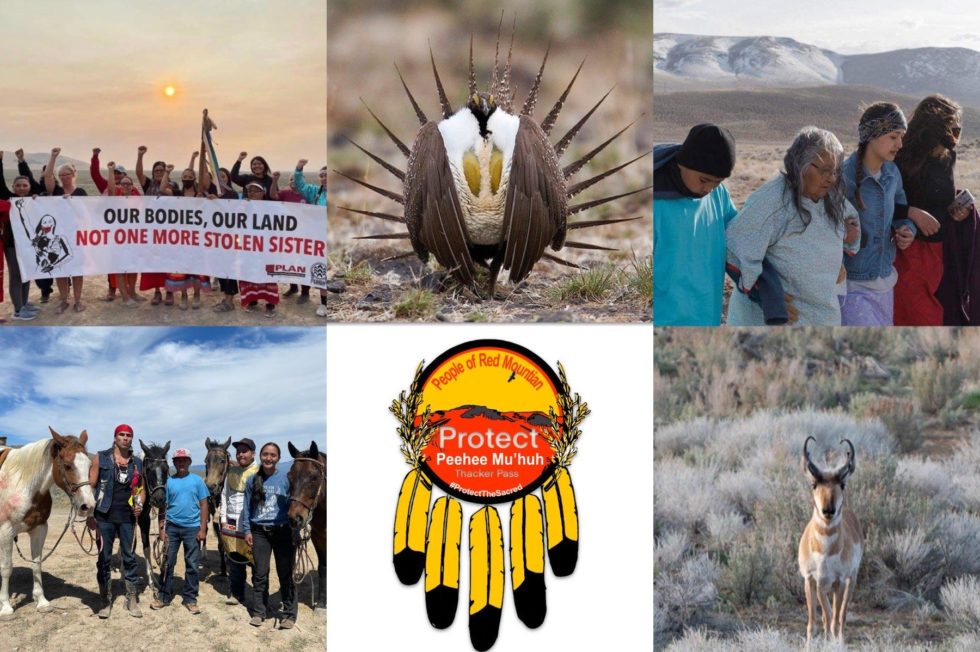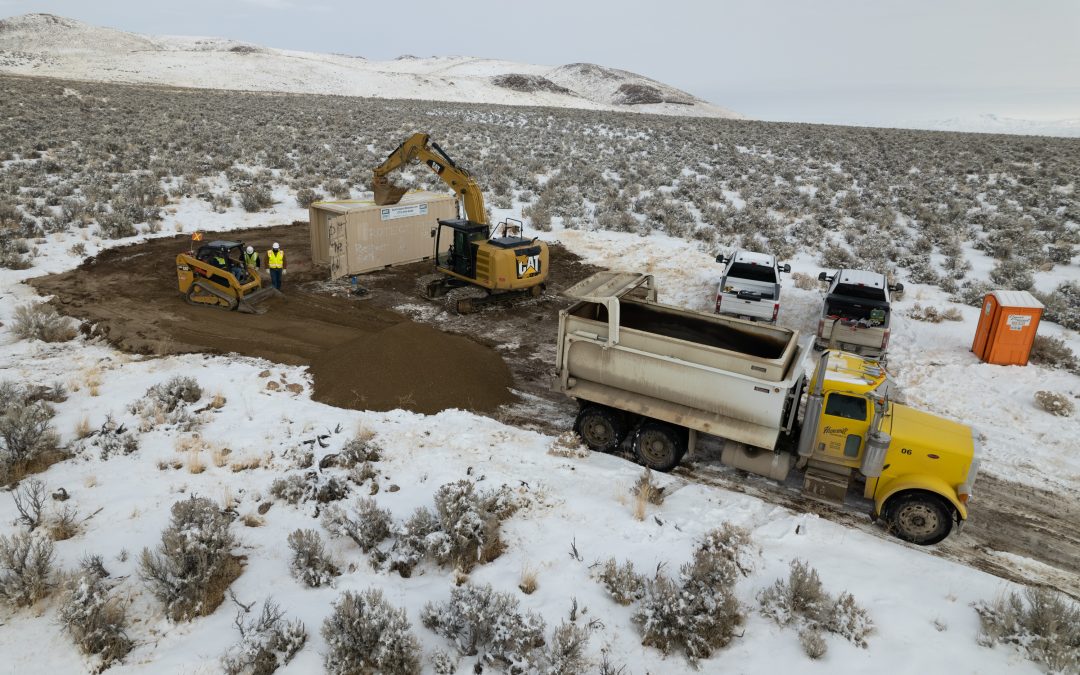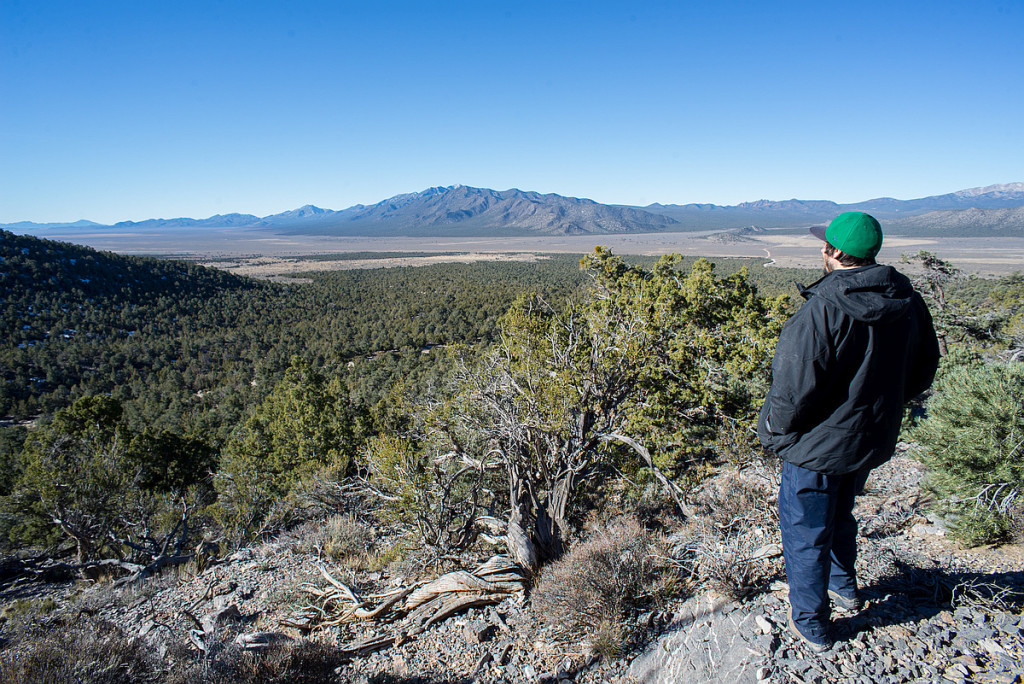RENO, NV — The Thacker Pass Lithium Mine in northern Nevada is headed back to Federal Court on January 5th as the lawsuits against the project near completion, but project opponents are raising the alarm that Lithium Nevada Corporation has already begun work on the proposed mine.
Lithium Nevada’s workers at Thacker Pass have begun digging test pits, bore holes, dumping gravel, building fencing, and installing security cameras where Native Americans often conduct ceremonies. Lithium Nevada also conducted “bulk sampling” earlier this year, and may be planning to dig dozens of new test pits across Thacker Pass. They’re claiming this work is legal under previous permits issued over a decade ago. But Tribes and mine opponents, including the Reno-Sparks Indian Colony and Summit Lake Paiute Tribe, disagree.
They point to language in the Final Environmental Impact Statement for the Thacker Pass Lithium Mine that says “authorization of [the mine] will terminate the [earlier permits].” The Federal permit for Thacker Pass was approved on January 15th, 2021.
Will Falk, attorney for the Reno-Sparks Indian Colony, explains: “Lithium Nevada told the government and the American public that it would terminate the older permits upon BLM’s approval of the Thacker Pass Project. Now they are going back on their word, it appears they are lying to get a headstart on building the Thacker Pass mine, and the BLM is allowing them to get away with it.”
Thacker Pass, known as Peehee Mu’huh in Paiute, is a sacred site to regional tribes whose ancestors lived in the area for thousands of years, and were massacred there on at least two occasions.
Michon Eben, Tribal Historic Preservation Officer at Reno-Sparks Indian Colony, says the site is incredibly important to Native American history. “Peehee Mu’huh is a sacred place where our ancestors lived and died. We still go there to pray, gather food and medicine, hunt, and teach our youth about the history of our people.” Eben and the Reno-Sparks Indian Colony are currently hosting an exhibit on the impacts of mining on Native people of Nevada.
Tribal members have stated in court filings that, because of the history of battles and massacres on the site, Thacker Pass is as significant to their culture as a site like Pearl Harbor is to American history. Arlan Melendez, Chairman of the Reno-Sparks Indian Colony, understands the importance of battle and massacre sites as both a Native American and as a U.S. Marine Corps veteran.
“As tribal leaders, it’s our responsibility to protect and honor our sacred places,” says Melendez. “Throughout US history, tribes have always been set up to lose in the US legal system against BLM. This Lithium Mine stands in the way of our roots and it’s violating the religious freedoms of our elders, our people.”
Falk, the Tribal attorney, says that Lithium Nevada’s construction activities at Thacker Pass are also violating tribal consultation rights.
“The Reno-Sparks Indian Colony and Summit Lake Paiute Tribe are still engaged in consultation with the BLM about the September 12, 1865 massacre site, a site that will be completely destroyed by Lithium Nevada’s mine if this project is built,” Falk says. “It’s hard to believe a government agency is consulting in good faith when they are already allowing the site to be harmed.”
Shelley Harjo, a tribal member from the Fort McDermitt Shoshone Paiute Tribe and an employee of the Reno-Sparks Indian Colony, has called the planned destruction of Thacker Pass “the biggest desecration and rape of a known Native American massacre site in our area.”
The upcoming January 5th hearing in Reno’s Federal Courthouse will be the final oral argument in the ongoing lawsuits against the Thacker Pass mine. Mine opponents are planning a march and rally outside. Plaintiffs, including the Reno-Sparks Indian Colony, Burns Paiute Tribe, four environmental organizations, and local rancher Edward Bartell, have alleged numerous violations of the law, and Judge Miranda Du is expected to issue her opinion in the case within days or weeks of the January 5th hearing.
“No matter what happens in court on January 5th, Thacker Pass is being destroyed right now and that threat will be ongoing,” says Max Wilbert, co-founder of Protect Thacker Pass. “We have to stop that.”
Lithium Nevada claims that its lithium mine will be essential to producing batteries for combating global warming, and the Biden administration has previously indicated some support for Thacker Pass. Opponents of the project have called this “greenwashing,” arguing that the project would harm important wildlife habitat and create significant pollution. They say that electric cars are still harmful to the planet.
Timeline
January 15, 2021 — Due to “fast-tracked” permitting under the Trump Administration, the Bureau of Land Management releases a Record of Decision approving the Thacker Pass mine less than a year after beginning the Environmental Impact Statement process. On the same day, Max Wilbert and Will Falk established the Protect Thacker Pass camp.
February 11, 2021 — Local rancher Edward Bartell files a lawsuit (Case No. 3:21-cv-00080-MMD-CLB) in U.S. District Court alleging the proposed mine violates the Endangered Species Act by harming Lahontan Cutthroat Trout, and would cause irreparable harm to springs, wet meadows, and water tables.
February 26, 2021 — Four environmental organizations (Basin and Range Watch, Great Basin Resource Watch, Wildlands Defense, and Western Watersheds Project) file another lawsuit (Case No. 3:21-cv-00103-MMD-CLB) in U.S. District Court, alleging that BLM violated the National Environmental Policy Act, Federal Land Policy Management Act, and other laws in permitting the Thacker Pass mine.
June 24, 2021 — The National Congress of American Indians (NCAI), the oldest and largest national organization of American Indian and Alaska Native tribal governments, calls on the Department of the Interior to rescind the permits for the Thacker Pass project.
Spring and Summer 2021 — Rallies, protests, and prayer runs take place in Orovada, Winnemucca, Reno, Carson City, and at Thacker Pass. More than 100 mine opponents gather at Thacker Pass to commemorate the 156-year anniversary of a September 12, 1865 massacre of at least 31 Northern Paiute men, women, and children committed by the 1st Nevada Cavalry. Thousands of people visit the site.
July 19, 2021 — The Reno-Sparks Indian Colony and Atsa koodakuh wyh Nuwu (People of Red Mountain) files a successful motion to intervene in Federal District Court (Case No. 3:21-cv-00080-MMD-CLB) alleging that the Bureau of Land Management (BLM) violated the National Historic Preservation Act (NHPA) in permitting the planned lithium mine.
August 2, 2021 — Burns Paiute Tribe files a motion to intervene on the side of tribal plaintiffs (Case No. 3:21-cv-00080-MMD-CLB).
September 15, 2021 — Bureau of Land Management accuses Will Falk and Max Wilbert of trespass for providing bathrooms to native elders at Thacker Pass, fining them $49,890.13.
October 8, 2021 — Eighteen native elders from three regional tribes request a BLM permit for their ceremonial camp. The BLM does not respond.
November 29, 2021 — The Reno-Sparks Indian Colony files an amended complaint in federal court alleging major previously unknown violations of the law. In January, Judge Miranda Du rejects the amended complaint because she wants to make a final decision on the case within a few months (note that the case has now continued for another calendar year).
February 11th, 2022 — Winnemucca Indian Colony files a motion to intervene in the lawsuit on the side of plaintiffs, claiming that BLM’s contention that they consulted with the Tribe is completely false. Judge Du rejects this motion shortly afterwards with the same reasoning used above.
April 4th, 2022 — Reno-Sparks Indian Colony files a Motion for Discovery Sanctions alleging that the BLM has been disobeying court orders and making “reckless, false statements” in a deliberate attempt to abuse the justice system and limit judicial oversight. Judge Du agrees with RSIC, but rejects the motion on a technicality.
August 2022 — BLM “discovers” five new historic sites at Thacker Pass and for the first time acknowledges the September 12, 1865 massacre took place, but continues to reject tribal expertise.
September 2022 — Lithium Nevada Corporation begins digging up portions of Thacker Pass for “bulk sampling” despite consultation still being ongoing between the Bureau of Land Management and regional tribes over cultural sites.
October 2022 — Dozens of mining activists from four continents visit Thacker Pass as part of the Western Mining Action Network biennial conference.
Contact:
Will Falk, Attorney for the Reno-Sparks Indian Colony and Summit Lake Paiute Tribe
Bethany Sam, Reno-Sparks Indian Colony Media Relations
Max Wilbert, Protect Thacker Pass







